Key takeaways:
- Inclusive community discussions foster understanding by allowing diverse viewpoints to be heard and respected.
- Sharing personal stories can bridge gaps and shift perspectives, emphasizing the need for empathy in advocacy.
- Creating respectful dialogue spaces and setting ground rules can significantly enhance the quality of discussions.
- Active listening and open-ended questions encourage deeper reflections and meaningful exchanges in conversations.
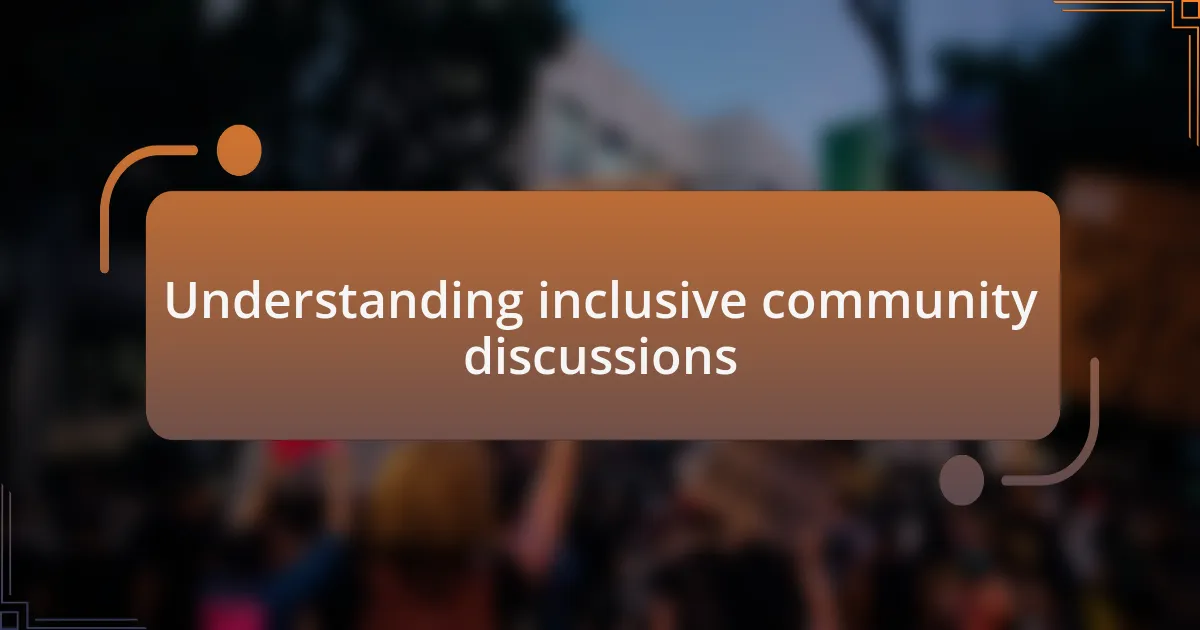
Understanding inclusive community discussions
Inclusive community discussions are essential for fostering understanding and respect among diverse viewpoints. I remember attending a local forum where passionate voices clashed—some advocating for pro-life perspectives while others championed reproductive rights. It struck me how much we sometimes talk past each other rather than with one another. Isn’t it vital to genuinely listen to opposing views, even when our beliefs are deeply held?
In these discussions, I’ve found that sharing personal stories can often bridge gaps between differing opinions. A friend once shared her experience of facing an unplanned pregnancy; hearing her narrative shifted my perspective. It made me reflect—how can we truly advocate for our beliefs without considering the lived experiences of those around us? Creating inclusive spaces means being open to these conversations, allowing everyone to feel heard.
Moreover, I’ve seen that when we approach discussions inclusively, we not only broaden our understanding but also empower others to share their truths. I often wonder, what would community dialogues look like if we prioritized empathy over debate? Emphasizing shared humanity can turn what feels like a confrontation into a collaborative exploration of beliefs. It’s in these moments we can discover common ground—even amid disagreement.
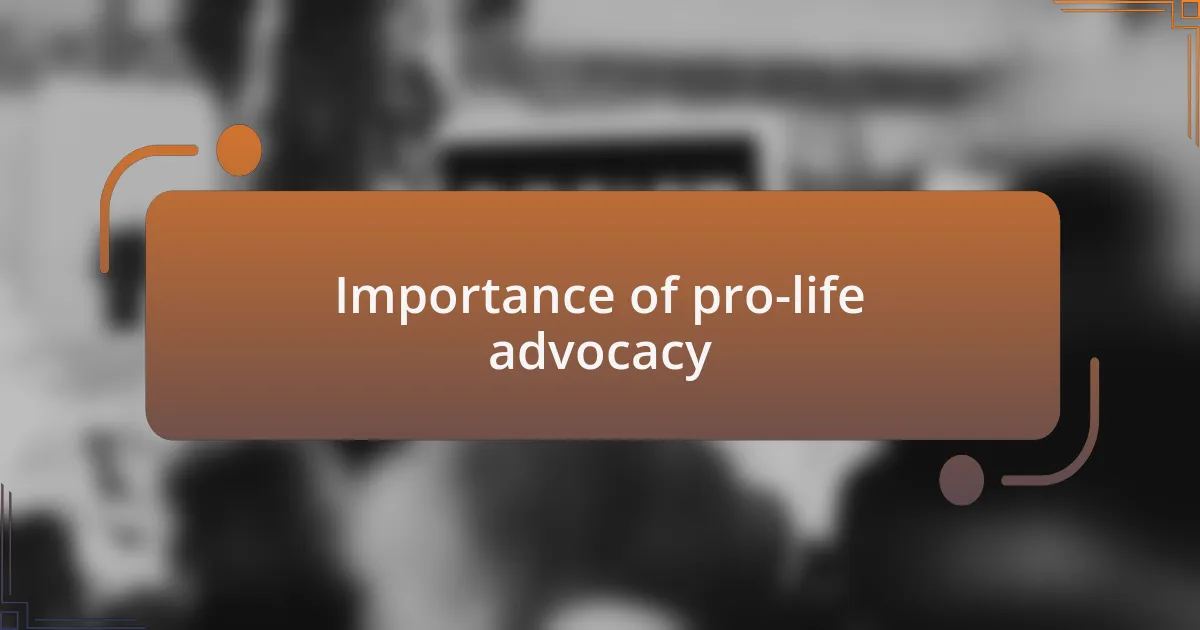
Importance of pro-life advocacy
Advocating for pro-life values is crucial because it emphasizes the dignity of every human life, from conception to natural death. I recall a moment during a community gathering where a young woman, visibly emotional, spoke about her pregnancy after a difficult diagnosis. Her story resonated with many in the room, reminding us that every life has potential and worth, regardless of circumstances. Isn’t it our responsibility to promote this understanding within our communities?
Moreover, pro-life advocacy plays a significant role in shaping policies that protect the vulnerable. I once volunteered at a crisis pregnancy center, where I saw firsthand the impact of supportive resources on expectant mothers facing challenging choices. It’s powerful to witness how providing alternatives can transform the narrative from despair to hope. How often do we reconsider the systemic changes needed to truly support life?
Lastly, pro-life advocacy nurtures a culture of compassion that extends beyond the issue of abortion. When I engage in discussions about this topic, I find that emphasizing care for both mothers and their children sparks meaningful dialogue. It begs the question—how can we collectively foster a society where love and support triumph over fear and isolation? By championing these values, we not only stand firm in our beliefs but also invite others into a story of hope and healing.
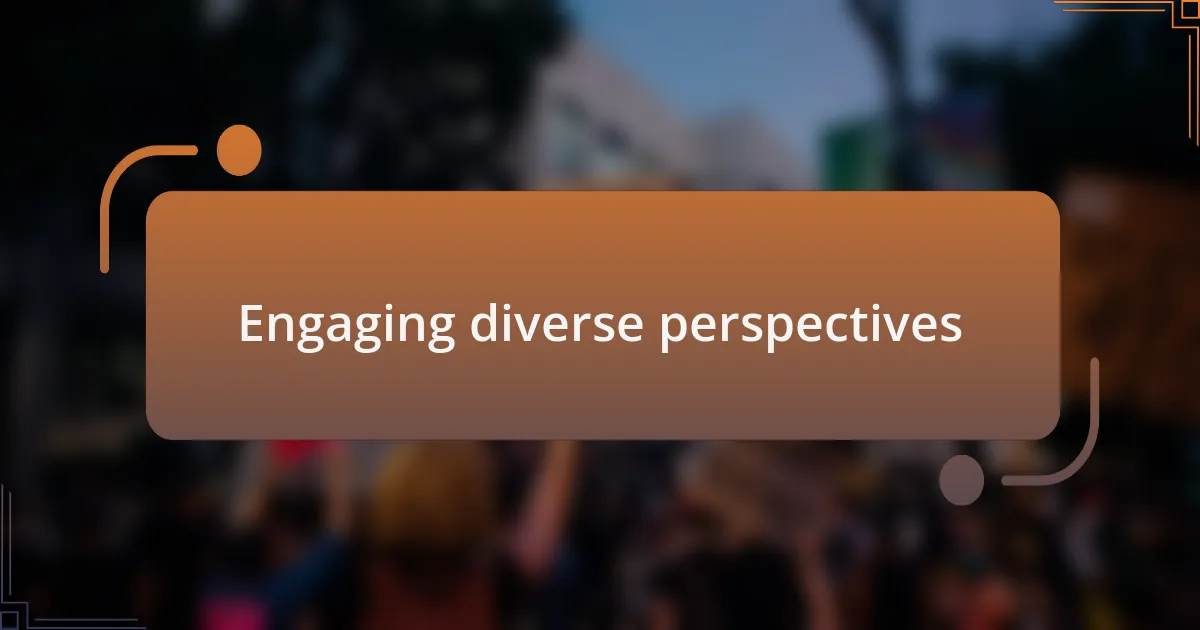
Engaging diverse perspectives
Engaging diverse perspectives within pro-life discussions is vital for broadening our understanding. I remember attending a town hall meeting where individuals from different backgrounds shared their views on reproductive rights. Hearing their varied stories not only challenged my own viewpoints but also revealed common threads that unite us in our shared humanity. How often do we take the time to listen, really listen, to those whose experiences differ from our own?
In my journey as a pro-life advocate, I’ve learned that diversity enriches conversations. During a roundtable discussion, a colleague shared her experience as a single mother and the support she needed, reminding us that the path to motherhood can take many forms. It’s essential to acknowledge these stories because they present opportunities for empathy and connection. What would happen if we all opened our hearts and minds to these narratives, forging alliances instead of divisions?
Moreover, engaging with differing perspectives fosters a culture of inclusivity. I often find that when I actively seek out voices that challenge my beliefs, it encourages deeper exploration and critical thinking. When was the last time you engaged with an opinion that contradicted yours? By embracing this approach, we can cultivate thoughtful dialogue that respects all life while inspiring a collective commitment to compassionate solutions.
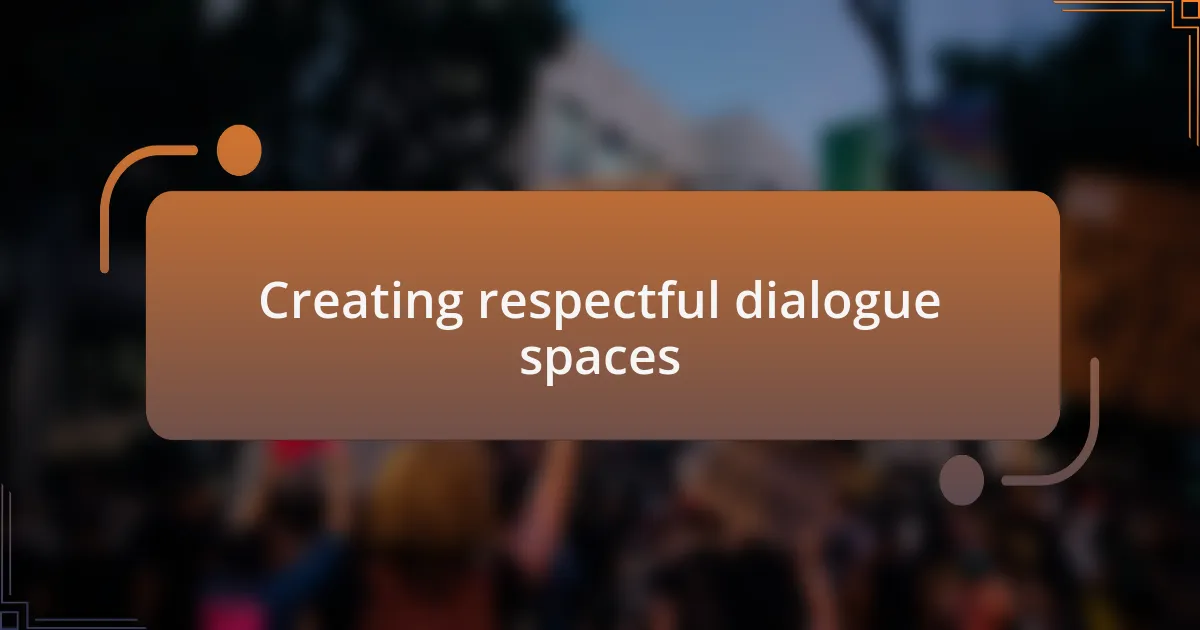
Creating respectful dialogue spaces
Creating respectful dialogue spaces is essential for fostering meaningful discussions around pro-life advocacy. I once participated in a small group discussion where, despite our differing beliefs, everyone committed to maintaining a respectful tone. This experience reminded me that the manner in which we communicate can profoundly impact how open we are to hearing one another. Isn’t it fascinating how kindness can create an environment where even the toughest subjects can be explored?
I believe that setting ground rules for dialogue can significantly enhance the quality of conversations. During one of my workshops, we established guidelines that encouraged each participant to speak without interruption and to listen actively. This simple shift transformed the atmosphere; people felt valued and heard. What if all our discussions were guided by such principles of respect? The potential for growth and understanding would be immense.
Moreover, I’ve noticed that personal anecdotes can bridge gaps in understanding. In conversations where someone shared their journey, whether it involved joy, pain, or uncertainty, it opened doors to empathy that statistics alone could never achieve. How often do we allow ourselves to be vulnerable in dialogue? When we share our stories, we not only humanize our convictions but also create a tapestry of experiences that celebrate our shared humanity.
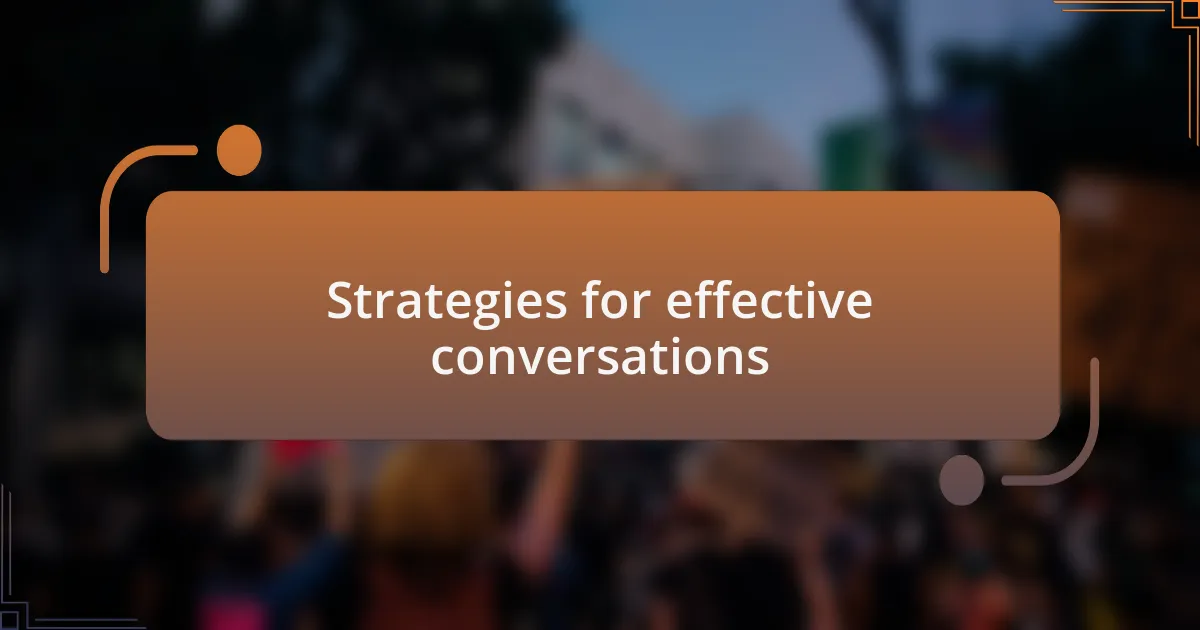
Strategies for effective conversations
When it comes to effective conversations, active listening cannot be overstated. I remember a recent discussion where one participant seemed to genuinely process the viewpoints of others before responding. It was remarkable to see how that simple act of attentiveness changed the dynamics; we were no longer just exchanging opinions but building a foundation of understanding. How often do we pause to truly listen instead of just waiting for our turn to speak?
Asking open-ended questions is another powerful strategy. I once asked a group, “What experiences have shaped your viewpoint on this issue?” The responses were diverse and heartfelt, revealing layers of complexity that I hadn’t considered before. Questions like these encourage deeper reflections and invite participants to share their truths, fostering a richer dialogue. Wouldn’t you agree that such inquiries open up new avenues of thought and connection?
Finally, sharing small, relatable moments can help ground conversations in reality. I’ve shared a personal story about my first encounter with pro-life activism; feeling both nervous and excited, I learned so much from the diverse views around me. That vulnerability sparked a genuine exchange, as others began to share their own experiences. How often do we think of our conversations as a way to connect through our shared stories? By integrating our individual journeys into the dialogue, we transform abstract discussions into relatable narratives that resonate with everyone involved.
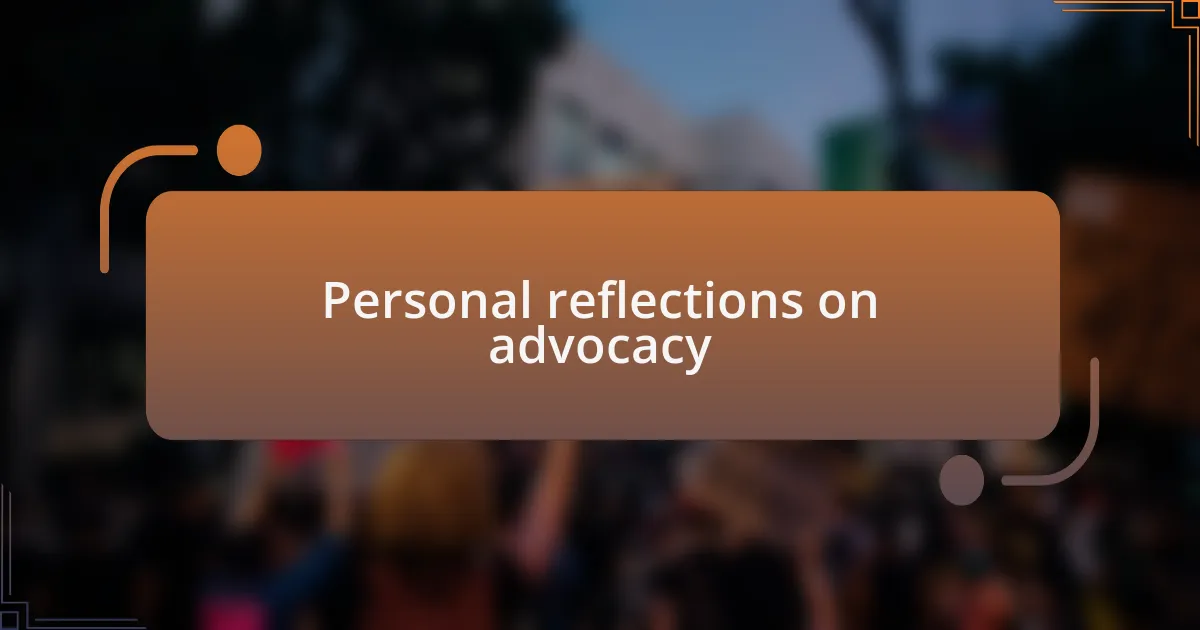
Personal reflections on advocacy
The journey of advocacy is deeply personal and often founded on our own experiences. I recall attending a community event where I heard a speaker share their story of loss related to pro-life issues. That moment struck me profoundly; it was not just about policy but about real lives and emotional journeys. How often do we underestimate the power of a single story to influence hearts and minds?
In my experience, advocacy is also about vulnerability. I remember feeling nervous when I first spoke about my views at a local meeting. Standing in front of a room full of people, I felt exposed, yet it was liberating. When I shared my doubts and challenges, I could see the audience nodding in recognition. Isn’t it fascinating how vulnerability can forge connections and create an environment where everyone feels safer speaking their truth?
Through time, I’ve learned that advocacy requires patience and openness to change. I once had a heated discussion with a friend who held opposing views; instead of ending in conflict, we chose to listen. Surprisingly, that conversation changed not just my perspective but also our friendship. How often do we find growth in the most unexpected places, simply by being willing to engage?